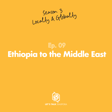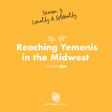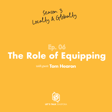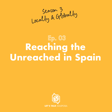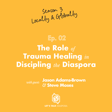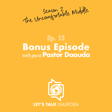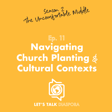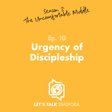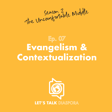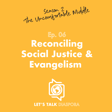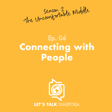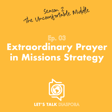The Uncomfortable Middle in Missions
00:00:09
Speaker
Wrapping up season two if you've been with us so far, it's been it's been a journey. It's been fun It's been a conversation. We've had several guests Rebecca one thing I'm learning and I don't know if the listeners agree Seems like the episodes are really good when we have someone else on we're not maybe We're not we're not the star of the show our guests are always the star of the show maybe we need more guests and
00:00:35
Speaker
It definitely makes less work on our part too. I enjoy the learning and the listening I get to do so I'm all for that Yeah, so today this final episode of season two We're just going to recap just from our our experience looking back at
Balancing Controversial Topics the Jesus Way
00:00:52
Speaker
the episodes. We recorded what what's been our takeaways and Maybe this will be a reminder to you or maybe you didn't listen to all the episodes You can go back and listen to some of the previous episodes but the the whole
00:01:04
Speaker
thrust of season two has been this idea of the uncomfortable middle. That there are, there's ditches that we can get into on almost every single topic in missions, evangelism, discipleship, church planting. But what we feel like is the healthy, faithful way forward is in the middle. And what we have to do is we have to hold these things in tension. And it's uncomfortable because there's people on each side who are saying, oh, why don't you commit to our camp? Or why don't you commit to our camp?
00:01:34
Speaker
But I don't think that's the Jesus way. I think the Jesus way is in the middle and embracing both of these things. So that's been the thrust, Rebecca.
Resources and Community in Missions
00:01:44
Speaker
Before we actually start going through episodes, because we'll have to remember who and what we've done, what is one primary takeaway? You're like, hey, this was super helpful for me. Maybe it's something you said, maybe it's something a guest said, or just a concept or idea.
00:01:59
Speaker
Well, as I go back and think about all that we have covered, one of the great pieces is all the resources that have been mentioned and talked about. And again, I'll say over and over in my life, I'm a constant wanting to learn more and
00:02:16
Speaker
So the resources really help and being able to hear these different guests and hearing their stories and being able to, you know, pick up new things. And I think as I listened to guest, I really was reminded of the spirit, how we have to be the led by the spirit and it isn't
00:02:36
Speaker
you know, this is the best practice and all of us need to be doing it, but as the spirit leads, that's what we need to be involved in and doing.
Gospel Proclamation vs. Social Justice
00:02:44
Speaker
And another big takeaway for me was the church, you know, and how important it is to not do this alone, but being out doing it with others. How about you, bud? What was a big takeaway or something that you really remember? Yeah, I just remember the discussion related around
00:03:05
Speaker
evangelism and social justice. We talked a lot about evangelism in a sense of, you know, Muslims, Hindus, but really the episode that we talked about, how do we live in this balance of gospel proclamation and gospel demonstration? Because I think
00:03:24
Speaker
for people in the diaspora who are engaging the unreached, most people aren't yet to the point where they're having to make decisions of what churches look like. They're having to decide what does it look like to hold this balance of gospel proclamation and gospel demonstration. So it was just super helpful for me because like the idea of this uncomfortable middle, I think we all skew to one direction or the other.
00:03:51
Speaker
I probably skew more toward gospel proclamation.
00:03:56
Speaker
and it's not an excuse. And I think one of the things that we talked about is if that is who you are and that is your leaning, perhaps that is your gift to the body of Christ, but you can't neglect the needs of people. That just means we need to mobilize people to meet needs. And in the diaspora, we have this huge resource called the local church that may not have people who are comfortable, equipped,
00:04:26
Speaker
or even encouraged to share the gospel with Muslims, Hindus, Buddhists, or Sikhs.
Roles and Collaboration in the Church
00:04:31
Speaker
But I would say every church is encouraging their people to be the hands and feet of Jesus, to meet needs. And so thinking about as a cross-cultural worker, we can hold those things in balance. And perhaps someone is on the other side and they just default to meeting physical needs, then they probably need to grow some,
00:04:55
Speaker
but they can just partner with someone who does have that and we can work together and together we're in the uncomfortable middle. Maybe it's not that each individual has to rest in that, that God made us unique. He's given us unique calls and roles and that's not a bad thing.
00:05:12
Speaker
Which I mean, that's what I mean when I talk about the church. It's just so much a part of who we all are in coming in and doing this together.
Avoiding Extremes in Theology and Methodology
00:05:22
Speaker
You said something earlier, and I just kind of wanted to bring it back up. Tell me a little more when you said ditches when we're talking about this uncomfortable middle.
00:05:34
Speaker
Yeah. So maybe I'll just paint a picture analogy. You're, you're driving down the road and we know that there's lines on the road that kind of guide us where to go. And what happens when we end up going past those lines or those boundaries, we end up in the ditch, meaning it's no longer the road. You've probably damaged your vehicle. It's not good. Well, I think in the realm of, um,
00:06:00
Speaker
I guess the word would be orthopraxy, like orthodox practice, that we have some lines in the road, but what happens is whenever we get this one concept, one idea, one theological truth that is accurate, what it does is like our car needs an alignment. It pulls towards the ditches.
00:06:25
Speaker
when you don't have the opposing view in hand that's also potentially a biblical truth or best practice, it pulls us into the ditch and we get damaged. We damage the people we're trying to reach. We're damaging our other brothers and sisters in Christ who are trying to pull us out of the ditch. And we're like, no, we love being in the ditch. And we're like, no, you're actually doing harm.
Maturity and Understanding in Missions
00:06:47
Speaker
So I don't know if that does a good job of painting the picture, but that's the whole idea of this uncomfortable middle is it's
00:06:55
Speaker
We have all of these things pulling on us. We have theological truths in the Bible that seem to be opposed to one another, but God presents them as they are and it's not our fault. It's not God's fault. We just have to hold them in tension because our minds are finite and we think these two things are opposed to one another, but God says they're really not. Or he wouldn't have presented because he's not a God of confusion.
00:07:20
Speaker
Well, and I think, I mean, as you're talking about that also think about how I can get stuck and I can get stuck in that ditch. Um, and you know, my tires can keep spinning, but I'm just stuck. So, um, and that it's an important piece to be able to see that opposing or that opposite, um, side and be learning and growing. Um, again, never be stuck in one place, but always moving ahead.
00:07:46
Speaker
Yeah, I think the polarizing nature of just where we find ourselves, we make it really difficult to hear people that oppose us. And we think we're right. Everyone thinks they're right or they wouldn't think the way they do. But I think maturity is at least hearing people from the other side and saying, okay, I at least understand your perspective.
00:08:09
Speaker
And whenever there's biblical truth in that and the Holy Spirit is leading us, I just trust that people who are in the ditch will get moved more towards the center. And they may be right center or they may be left center, but they're
Self-Assessment in Mission Methods
00:08:22
Speaker
not in the ditch. And I think that's the key is we just want to see things move forward. We don't want to see people in the ditch, their tires spinning. It's like they're just not seeing God, God move. And it's like, well,
00:08:35
Speaker
Are you blaming God or could you at least look at how and what you're doing and saying reevaluate what I'm doing? Because one thing I think is really, it happens a lot, but I really want to caution people is like when they're trying to reach an unreached people group and like, yes, they're hard to reach, they're unreached for a reason. They're spiritual strongholds, but they say things like, well, it's just, maybe it's just not God's time for them. And I'm like, you're blaming God for people going to hell.
00:09:04
Speaker
And there's some theological things to unravel in that, but before we get to that point, can we at least evaluate our dogma, our practice, our methods, and saying, is it something I'm doing that could potentially be the issue before I start, you know, they don't really do it this way.
Season Two Recap
00:09:29
Speaker
They're pointing their finger at God and saying, well, God, it's your fault that these people are unreached.
00:09:33
Speaker
I'm like, well, I think God has made the way, the path. He's paid everything. He's done everything that's needed to be done. Um, I don't, I don't want to go in that direction. I want, I want to evaluate what I do. Which I hear you say that let's be obedient to what God's called us to do and leave the timing and the when it's all going to happen up to him and the ways it's going to happen as well.
00:10:00
Speaker
All right, well, Bud, let's talk again. Let's review some of the things that we've discussed this season. It's been a full pack season and I foresee that we're going to be coming back to some of these topics again.
Terminology Debate: Missionary vs. Apostolic Worker
00:10:14
Speaker
Absolutely. You know, we started with just talking about the big picture. Like what is, if you remember from the second episode, really the first episode after the introduction was what is the pattern
00:10:30
Speaker
in the Bible. And we talked about, you know, going to people, proclaiming the gospel, discipling people, planting churches, raising up leaders. But there's one thing I just want to reiterate in that is I just, the more and more I think about this, I want to use biblical language and I'm growing in this. But talking about what is a missionary versus an apostolic worker,
00:10:52
Speaker
Haradi Jews are some of the most unreached people in the world. But God is moving in this community and we sense that the time has arrived to increase our efforts to reach them with the good news.
Prayer for Haradi Jews
00:11:02
Speaker
The key to this outreach is prayer. We invite you to journey with us into the world of the Haradium and to meet Haradi men and women as well as the believers who serve them and to join us in the critical work of prayerful intercession.
00:11:15
Speaker
Start learning and praying with us today with a free digital download or you can request a free copy at upgnorthamerica.com forward slash resources.
Terminology and Clarity in Missions
00:11:27
Speaker
But talking about what what is a missionary versus an apostolic worker.
00:11:33
Speaker
And I think it's important that that term is, you know, dear to me, because I think there's a lot of misunderstanding of what a missionary is. We want to let the Bible define that, but there's lots of terms that we use that are extra biblical. And when we don't attach a definition, whoever is listening attaches their own definition and there's misunderstanding.
00:11:53
Speaker
And so I think that was something that was really important that I felt like I needed to communicate in that episode is to the best of our ability. Let's think about biblical language, missionary versus apostolic worker. I say apostolic worker because people get really uncomfortable if I just say Apostle and they're like, what?
00:12:13
Speaker
Yes, there's been misuse of that word and a lot of abuse around it and misunderstanding, but I think that's that was one thing I had to remember back to, but I thought it was important.
00:12:26
Speaker
Well, even someone laughed at me this last week when I was saying the word missionary and I thought how I need to change my vocabulary back to that apostolic worker. You know, it is such a great term and biblical term where we had mentioned, you know, it's not missionaries not in the Bible.
00:12:45
Speaker
Yeah, I've heard an alternative. A friend of mine, she's a dear friend. Her kids have lived in Central Asia, just a prayer partner, prayer warrior. She always talks about our sent out ones.
00:13:04
Speaker
which really is exactly what the word apostolic worker is. It's just our sent out ones. And so if you're more comfortable with that, that's more biblical than the missionary actually is.
Prayer as a Foundation in Missions
00:13:16
Speaker
And it's definitely a lot easier for me to say.
00:13:23
Speaker
Well, we have the intro or the big picture. And then after we talked about the big picture, we jumped into prayer, which is the foundation. I think just being reminded that we can't do anything that we do without basing it in prayer.
00:13:39
Speaker
So I really enjoyed that episode. And again, I think we could do a whole season on prayer and the strategies of prayer. It's very dear and means a lot to me. So I enjoyed that discussion. We went on then to talk about connecting with people. And we also had an interview with someone and had some very creative ways she was connecting with people and sharing Christ with people. I loved that interview with Haley.
00:14:09
Speaker
Yeah, Haley is a great example. The thing is, though, is we know that there are dozens and dozens of people and examples doing that. And we just want to hold that up and say, hey, this is really good. Like, we don't have every answer. The Lord may be giving you an idea of a creative way to connect with people from an unreached people group.
Creative Connection Methods
00:14:32
Speaker
Pursue it. Try it. This is the thing that sometimes a phrase that we use a lot in our network is, it's okay to fail forward. Meaning, if you think this is a good idea, just do it. If you fail, you're not really failing your learning. But that's why failing forward, I'm going forward in a failure. But even looking at failure differently of saying, this wasn't a failure, it was a learning experience.
00:14:59
Speaker
And I think we would like to hear from people, and I'd love for people to reach out and contact us in ways that they're seeing God work in creative ways and new ways through diaspora.
Success Stories in Evangelism
00:15:14
Speaker
I'd love to hear more stories like Haley's. Absolutely. So what were the next topics, Bud, that we discussed?
00:15:23
Speaker
Yeah, we talked about which already mentioned like the balance between social justice, evangelism, demonstration proclamation. That was a good conversation. And then we moved on to just a general topic conversation about evangelism and methods and bridges.
00:15:41
Speaker
Again, all of these things could be not just episodes, but seasons in themselves. So we're just touching the surface. And perhaps you can look at it in this way if you're listening and you're like, I need about four more episodes of this topic. Just share that with us because at this point, we're just brainstorming and thinking what potentially is going to connect with the need people are having.
00:16:05
Speaker
But we would really love to hear from you of what is beneficial. And then along with that best methods and bridges we had on Fwad Mossery from the Crescent Project, really sharing about, you mentioned resources, sharing about a great resource, Crescent Project has created all kinds of great resources with sharing with Muslims, but just so many stories that he told of interacting with Muslims, seeing them come to faith, experience truth, reading the Bible,
00:16:34
Speaker
in North America, across Europe, and in the Middle East. That was such an encouraging interview with Fwad. And as I want to kind of bring up even for this episode another resource that I've come across that people might be aware of, but I came across after listening to Fwad about sharing with Muslims a resource on a Bible study looking at Muslims and how to begin just to see Muslims through the scriptures.
Engaging Hindus: Cultural Understanding
00:17:05
Speaker
And we also had an interview with someone on Hindu's, Ken Roberts, which was really encouraging. I think he's up in your area of the woods in Texas. Yeah, Ken is just has an amazing experience. Honestly, there's probably a lot of people who listened to that podcast and it was a lot of foreign information.
00:17:35
Speaker
But this is a brother that's been around Hindus for a decade or more, and I think 12 years working, seeing fruit. And in the diaspora, I would say the primary place that we have the ability to grow is our engagement with Hindus. There's some people that are seeing traction with Muslims. We have some things figured out of how to really bridge and contextualize well.
00:18:01
Speaker
With Hindus, it's a challenge for multiple reasons. One is it's not an Abrahamic faith. We have no similar starting point. It's an Eastern religion. Two, just the way they think of spiritual things are entirely different.
00:18:20
Speaker
But he talked about this as just how diverse India is in Hinduism is as Hinduism is wasn't even a religion, you know, prior to the British colonizing India, they put them in this box, a really a box that that was never purpose to be. And so then we have this title Hinduism. And I've just learned from experience connecting with northern Indians versus southern Indians, I have to have a different approach.
00:18:46
Speaker
Uh, Northern Indians are much more religious. I can talk about guru Yeshu and how I'm a follower of guru Yeshu. But if I say that to a Southern India, they're like, we don't follow a guru. Like it's, it's totally misses the point. So like a Gujarati or a Hindi speaker, one approach works a little bit better. I'm not saying I'm, I'm, I'm good. I'm practicing, but someone from like Hyderabad, it's totally different. Um,
00:19:14
Speaker
way of connecting and just starting to try to bridge. So I think that's the other challenge is there's just so much diversity in the Hindu community. In the diaspora, if you're in India, you kind of get like, I'm in Gujarat, you're kind of working among a homogenous unit, or at least a couple, you get into the diaspora.
Approaches to the Hindu Diaspora
00:19:35
Speaker
and you get into a city where there's maybe 100,000 Hindus but 30,000 are from Gujarat, 20,000 are from Mumbai, you have 30,000 from Hyderabad and then they're all congregating together some but they work together, they shop together and if that's your points of entry, you don't really know who you're talking to until you develop a relationship. Well, I know a lot of my
00:20:00
Speaker
relationships with Hindus here in the States and North America has been there. They're also have higher paying jobs and sometimes harder to reach because they don't seem as needy as maybe some people coming in now, not all, but a number of them are.
00:20:18
Speaker
And so the importance of people in their professions, knowing how to share with the Hindu, I guess it brings back to that. We probably need to do some more teaching and looking at Hindus, and especially in the diaspora setting. Yeah. And then another episode, and I think this was one that's really important. As I mentioned, a lot of people, whenever we think of like the phase of
00:20:48
Speaker
Engagement among the diaspora, you know, definitely we're seeing people come to faith a lot of workers who are American are still in the gospel sharing phase Maybe they've only seen one or two people come to faith or maybe none but we talked about the urgency of short-term discipleship and Before you get the need for discipleship. You have to have the plan you're going to use at least the process you have to know Okay, what do I do when someone says yes?
00:21:18
Speaker
And it's going to look different based off the segment that you're working with. So we've not talked a lot about Buddhists or Sikhs, but I think most of the engagement in North America is Muslim and Hindu. I know very, very few people working with Sikhs. We want to wave the Sikh banner. If you want to learn how to reach Sikhs, we can make some connections for you.
Short-term Discipleship Planning
00:21:39
Speaker
Same thing with Buddhists, but I think a lot of the people that are doing it just based off the size of the community and the access is primarily Muslim and Hindu.
00:21:47
Speaker
But with a Hindu not having an Abrahamic faith background, really a short-term discipleship set.
00:21:56
Speaker
probably needs to start with a creation account because you have to build some foundation into their worldview. Like their worldview has to shift of, okay, there was, there was a creation. It didn't just begin in karma, but gain and like, there's, there's so much that has to shift versus with a Muslim. Um, you know, definitely there's differences in the Abrahamic story from creation to Abraham.
00:22:22
Speaker
But the big rocks are kind of there. You're just clarifying the nuance between what this is what the Quran says. But this is what actually the Torah, the Torah, the Bible says. And then you can build on the idea of sacrifices. And then really, they're already accustomed to this idea of obedience. And so you can lean more into, now, this is what we do as followers of Jesus. Or with a Hindu, you can do that. But I think there's a lot of need for building that foundation of their worldview.
00:22:53
Speaker
And having that kind of in your pocket is important. Just last night, we had a new team and a...
00:23:01
Speaker
part of our city and we're out just in an apartment complex going going door to door and one we meet meet a Hindu and this couple has like okay, no idea what to do. So I'm just modeling and so like that may be you maybe you need someone to model but then we find this Latino lady who we share the gospel with and she's ready to repent and believe
00:23:23
Speaker
And then we debrief afterwards because they're so new. I was like, okay, now this is what has to happen. You have to follow up as quickly as possible. Like go back after, like after she has dinner. Hey, do you have an hour right now? And then that's the urgency of discipleship we were talking about, but they have to know what to do before the need arises.
00:23:47
Speaker
And it's going to look different, which I think kind of goes into that other topic that we discussed was contextualization. And well, well, no, also we talked about going into a church. We have to really start that discipleship before we really start to help them determine what is church going to look like for them, which was the next topic.
Contextualized Church Practices
00:24:10
Speaker
I think that's a very good way to say it is if we move them to church before discipleship, they have no idea what church looks like, and then we are prescribing what it looks like. And then that is not contextualization. That is me saying this is what you do. But as you start with the urgency of short-term discipleship, this is what it means to follow Jesus.
00:24:34
Speaker
It culminates in that short term discipleship lesson set as this is what the body of Christ is and this is what they do. But then they discern through their cultural worldview, what does it look like to pray? What does it look like to give? What does it look like to be devoted to the word of God? What does it look like to break bread? What does it look like to do all the things that we know that a church should be doing?
00:25:02
Speaker
without prescribing it, letting them discover it for themselves. And then they are saying, well, this is what it looks like for us to worship. And we just sit back and say, hallelujah. And what a personal way for them to be able to see that on their own and how they're going to definitely be able to figure out church for themselves and not us telling them what church is to look like and to be. What other topics? Am I missing something else? Are we missing anything that we discuss this
00:25:33
Speaker
Tom, this term, this season? Yeah, I think we've hit the high levels of what was covered in season two. I don't know that we perfectly did it, but we were really just trying to present these ideas that have extremes. So you think of gospel social justice. You have those extremes where people are going to share the gospel, but not give a cup of water. You have people who are going to
00:25:59
Speaker
Buy them cars, deliver them food, but never share the gospel. Discipleship you have, oh, we're not going to disciple. We're going to bring them to church versus we're never going to bring them to church. You have, hey, this is how you do church versus, you know.
00:26:12
Speaker
Maybe the other side, people would say it's insider movements where there's no distinction whatsoever from the previous religious culture and they're just putting Jesus on top of it. That's syncretism, that's another extreme. So we've tried to present these ideas fairly. Obviously our bias has come through. We can't come to this and saying we're unbiased, but hopefully you've heard that we've been fair in presenting. Here are the ditches.
00:26:39
Speaker
And what we're trying to say is the way forward, the Jesus way is somewhere in the middle.
Season Three Preview
00:26:45
Speaker
And we can easily get stuck in ditches ourselves and are always working on our Jesus way. Always working on the Jesus way. I had a pastor, my first pastor when I came to faith, he always repeated this and stuck with me. He says, pride always becomes before the fall.
00:27:07
Speaker
And so if you're listening and you're like, oh, that's not me, well, brother or sister, pride always comes before the ditch. For sure, for sure. Well, but in the big picture, we discussed a number of phases, but we didn't really go a lot into what I'm remembering, maybe those last two phases of church planning and leadership training. Is that what we're thinking our next season is going to be about or where are we leaning?
00:27:34
Speaker
Yeah, we'd love to hear from the listeners if that is a direction that we can go, if there's more tactical things we want to cover. If we don't hear from you, we're going to move into a conversation around diaspora, church planting among the unreached and leadership development. And so what that means is as we move into that, what we're going to try to do is get people from an unreached people group who have come to faith, who are planting churches and developing leaders in their community, and we want to hear from them.
00:28:04
Speaker
We don't want to pretend like we have it figured out. So if we don't hear from you, that's our plan is we're going to talk about next season, church planting, leadership development. But we're going to learn from our Muslim, Hindu, Buddhist and Sikh background brothers and sisters and let them inform us. And we are just going to kind of steer the ship and let people get on and off. And you get to listen in on all of those wonderful conversations.
00:28:28
Speaker
And as we've said, please, please reach out and let us know what you're interested in, what's the hot topic you'd like to hear more about. And we do pray that you'll find your uncomfortable middle, the Jesus way. And thank you for listening to Let's Talk Diaspora.

